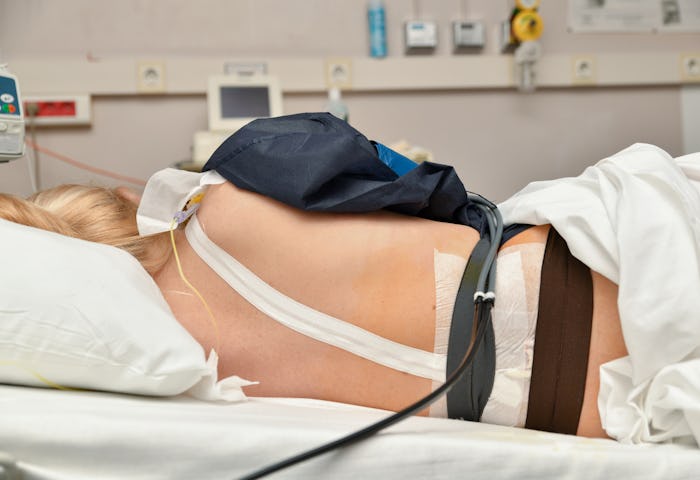Life

Here's The Deal With Epidurals Possibly Causing You Anxiety During Childbirth
If you've ever had an epidural during childbirth — or are considering the option — you know that the whole point of this popular form of pain relief is to make the labor experience less stressful (off-the-charts pain is pretty stressful, after all). And in most cases, the injection of anesthesia into the area around the spinal cord is pretty effective at making the birth process a lot more comfortable. But what about the stress? Can epidurals actually cause anxiety during childbirth?
Naturally, many women experience some degree of anxiety leading up to an epidural, especially if it's the first time. While the procedure is super common, it's also undeniably intense — there's no getting around the fact that a big needle is being inserted extremely close to your spine. Still, once the administration part is over, the anxiety should disappear... right?
Research shows that's generally the case. One study published in the Journal of Psychosomatic Obstetrics & Gynecology, for example, found that women’s anxiety decreased significantly after getting epidural anesthesia, and remained low for the 24 hours following birth. And while epidurals have something of a reputation for slowing labor down, necessitating the use of Pitocin to stimulate contractions, they can actually help to move things along.
"Some prolonged labors, probably those slowed by anxiety, speed up with an epidural," explained Penny Simkin, PT childbirth educator and co-founder of DONA International and PATTCh (Prevention and Treatment of Traumatic Childbirth), on her website.
"Anxiety can cause excessive production of the mother’s stress hormones such as epinephrine and norepinephrine, which slow contractions. By allowing the mother to rest without pain, the epidural removes her anxiety and her labor progress may improve," Simkin wrote.
Not only can an epidural help to ease anxiety during childbirth, but some research has shown that "certain women who experience good pain relief from epidural analgesia are less likely to exhibit depressive symptoms in the postpartum period," as TIME reported. It makes sense, when you think about it: New motherhood is anxiety-inducing enough without starting everything off in excruciating pain.
Then again, other findings suggest the opposite is true. One study published in Depression and Anxiety found that women who received synthetic oxytocin might be more likely to experience postpartum depression or anxiety, according to the American Psychiatric Association. Researchers pointed out that there were still many unanswered questions about this connection, however.
“Before we can make any firm conclusions, we need to better understand how these different indications for oxytocin might affect risk,” lead study author Kristina Deligiannidis, M.D., was quoted as saying.
So if you're anxious about your epidural making you anxious, it might help you to know that the odds are apparently in your favor, mostly. Every labor and every woman is different, and there's no guarantee that your experience will follow a certain blueprint, but there are plenty of other things to be anxious about that are a lot more likely to cause you stress (such as getting that baby to sleep through the night once she's out). In other words, save that anxiety for something else!